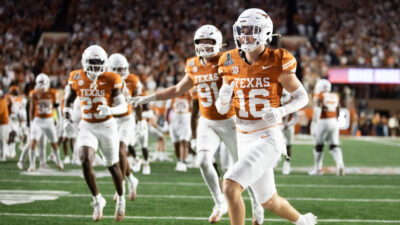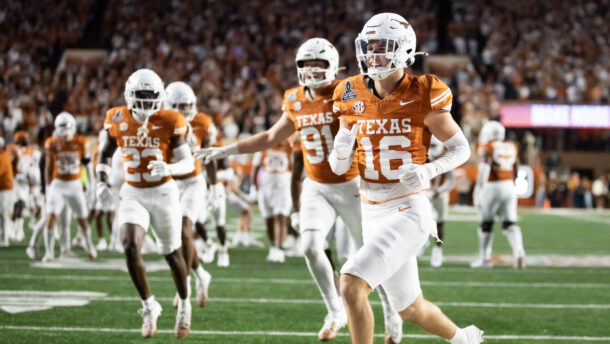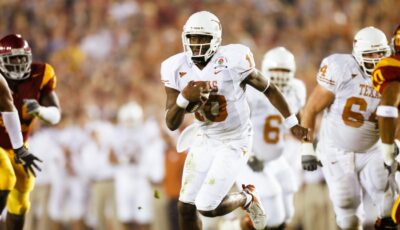
O’Gara: A farewell to ‘SEC on CBS,’ which turned native Midwesterners like me into a long-distance admirer
On Saturday afternoon of Halloween weekend in 2008, my brother and I crashed on the oversized couch of my college common room and turned on the “SEC on CBS” game.
We had just returned from the Central Michigan-Indiana barnburner, where we bolted early instead of staying 3 1/2 hours on a cold, gray Midwest fall day. The sparse crowd that we left at Indiana’s Memorial Stadium that day was nothing like the one we watched on CBS between Florida and Georgia in Jacksonville. For a couple of kids like us attending college in Indiana — I was a freshman at IU and my brother was a sophomore on the Valparaiso baseball team — “SEC on CBS” transported us to a different world.
As we took in the action from 900 miles away, we wondered about how incredible it would be to go to an SEC school and have fall Saturdays with big-time college football like the ones we watched on CBS. We debated which school we’d want to attend to get that kind of experience (his choice was LSU and mine was Florida).
Football just felt bigger. It was bigger. Even a couple of native Midwesterners who had only attended Big Ten games could see that.
Fifteen years later, that feeling remains. It’s fitting that he now lives in an SEC town (Lexington) with his wife and I also live in the South (I’d argue Orlando has a bubble around it but geography says it’s technically “the South”), where I’m in my 7th season covering the SEC. Every one of those fall Saturdays, without fail, I’ve either been at the 3:30 SEC on CBS game, or I’ve watched it from my oversized couch.
On Saturday, SEC on CBS will air its last regular season game when Alabama and Georgia square off in the SEC Championship. It’s the end of a 27-year era. It’s strange to think it’ll be the last time that the snare drums will drop for a marquee SEC game. The network that became synonymous with the SEC’s run of 13 national champions in the past 17 seasons will soon be home to, ironically enough, the Big Ten.
The end of the SEC on CBS relationship — and the beginning of the SEC’s exclusive ESPN relationship in 2024 — is a casualty of booming TV contracts. CBS’ 15-year agreement with the SEC is ending, though as Yahoo’s Ross Dellenger reported, it began to end more than a decade ago over a disagreement involving revenue shares for new SEC members Texas A&M and Mizzou.
No more iconic jingle. The Big Ten got that in the SEC on CBS divorce.
No more hurling insults at Gary Danielson. The Big Ten also got that in the SEC on CBS divorce.
Fifteen years after my brother and I listened to Danielson on the call with Verne Lundquist, I sat on an oversized couch in Nashville and chatted with the highly scrutinized SEC on CBS color commentator. Danielson and longtime SEC on CBS consumers like me might disagree on things said within a broadcast, but he and I have plenty in common. We both went to a Big Ten college in Indiana — people forget that Danielson was a quarterback at Purdue — and have since made our life’s work covering SEC football as Florida residents.
Why? I’ll let Danielson explain that one.
“I’ve had consequences for games for 17 straight years. That’s why you get that fever pitch. College football is a game of opinions. The fan bases, they’re all in. When you say something that’s not good to their ears, it’s like you’re talking to their brother, or their sister, or their mom or their dad. They’re upset,” Danielson said in July. “The demographics have moved to the South, and that’s been a benefit. When I was growing up, the demographics favored the Big Ten. That’s where the steel mills were. That’s where the car factories were. That’s where the players were.
“The real hidden strength of (the SEC) is the demand of the fan base. You have to produce. You, Saturday Down South, have to produce. You can’t lollygag and give them crap. You’ve gotta produce … we all have to produce. It’s been great. That’s the way it should be.”
Think about it. Few networks truly have become part of a conference or a league’s identity, and none have been around as long. It takes time.
Or rather, it takes timing.
FOX’s “Big Noon Saturday” only began in 2019 with the hope that the Big Ten, Big 12 and Pac-12 would all capitalize on that early window instead of competing with with SEC on CBS at 3:30. “Pac-12 After Dark” won’t be a thing next year after the conference dissolved amid failing long-term TV contract negotiations with major networks. The ACC is tied to ESPN, and that contract has been criticized as a hindrance to potential growth because it’s part of a Grant of Rights deal that won’t allow the conference to renegotiate terms until it ends in 2036.
Timing was everything for the SEC in its CBS partnership, which was the highest-rated regular season college football package on any network in each of the last 14 seasons (H/T Yahoo).
“We’ve played, in my opinion, a nice part in the formula that created this SEC monster,” Danielson said. “Having a standalone game at a network at 3:30 was a big leap for CBS at the time. It was a regional game. CBS got lucky, and I think the SEC got lucky to have a place where around the country, they could see the same announcing team, the same game. It became the standard in college football.”
He’s right. It’s the standard. SEC on CBS was there to chronicle no shortage of iconic moments.
“The Stoerner Stumble” of 1998 will always be remembered for then CBS play-by-play man Sean McDonough belted out “Stoerner … lost the football! Oh my goodness! He stumbled and fumbled!”
Or what about when Lundquist let out his classic “oh my goodness! Oh no!” after “The Prayer at Jordan-Hare.”
Of course, there’s only 1 Kick-6. But remember what made that play one for the ages. Like, besides the fact that it prevented Alabama from 3-peating and it sent the Tigers to the SEC Championship in the most dramatic way possible.
CBS cameras kept that reverse trailing angle on the rare “field goal return attempt” and let the audience watch that play develop in real time.
What consumers don’t hear or see in the SEC on CBS production of that moment was what preceded it. The debate over whether Alabama deserved to have a second added to the clock on Kenyan Drake’s reception was essentially squashed by the CBS cameras. Ten years after that play, Danielson still remembered the magnitude of getting it right on the broadcast.
“I’m on talkback with my producer. I go, ‘You’ve got to get the camera and his foot in a split screen, or we’re not gonna know (if he got out of bounds),'” Danielson said. “I might be demanding the impossible, but one of our guys will raise their hand and go, ‘I can do it.’ We’re really proud of that stuff. And we also understand how important college football is.”
ESPN recognized how important the SEC is to college football. Hence, the $3 billion contract it agreed to for the next 10 years. It’s a contract in a different stratosphere than the 15-year, $825 million deal ($55 million per year) that the conference had with CBS to have first pick of its premier game of the week and 2 doubleheaders per season.
As the SEC won title after title during that 15-year contract, that became a bargain perhaps unlike any in the sport. The network’s refusal to tweak the terms with the addition of A&M and Mizzou in the conference in 2012 — Yahoo reported that ESPN was willing to do that for the new members — got us to this place.
What remains to be seen is if ESPN can capture what CBS did. It seems impossible, and not just because the snare drums are staying with CBS and now the Big Ten. ESPN won’t be paving the way like CBS did in 1996 when it began its SEC relationship. CBS is synonymous with the SEC’s 21st century return to glory. Networks don’t score touchdowns, but they do shape perceptions of conferences from coast to coast, and as Nick Saban pointed out, the CBS exposure might’ve played a part in some history.
“We were the first conference to have their own network. Which was huge in building the conference years ago because everybody else had regional games. Mark Ingram might be the first Heisman winner, I can’t verify this for sure, that never really won the Southeast,” Saban said on the Hey Coach Show a few weeks ago. “He won because we were on CBS and it was national, so everybody saw him play all the time. That’s a tribute to CBS, their relationship with the SEC, and giving us a national network.”
For plenty of people across the country like myself without southern roots, SEC on CBS wasn’t so much home as it was an escape into another universe. Coaches, players and announcers came and went, though with all due respect to Jim Nantz, McDonough and Brad Nessler, you’d be hard pressed to think of 2 people more intertwined with the SEC on CBS product than Lundquist and Danielson. Well, same with Saban, who admitted that he “hates” that the SEC on CBS is coming to an end.
As Danielson prepared to close the final chapter of SEC on CBS, I asked him about his feelings as he approaches the new chapter of his career.
“I don’t really worry about (my future), honestly. I might if I was 50, but I’m Nick Saban’s age. I’m 72. This is my 34th year,” Danielson said. “I’ll roll with it. Listen. I’ll be doing Big Ten games. It’s not a bad gig. There’s a lot of intensity there. Great football. I’ve been charmed. … I’ve had great games, I’ve had Hall of Fame partners, I started with Brent Musburger and we did 2 national championships together. I chose to come to the SEC … it’s been a monster.
“It’s been great to be a part of it. It’s been a great ride.”
Connor O'Gara is the senior national columnist for Saturday Down South. He's a member of the Football Writers Association of America. After spending his entire life living in B1G country, he moved to the South in 2015.







